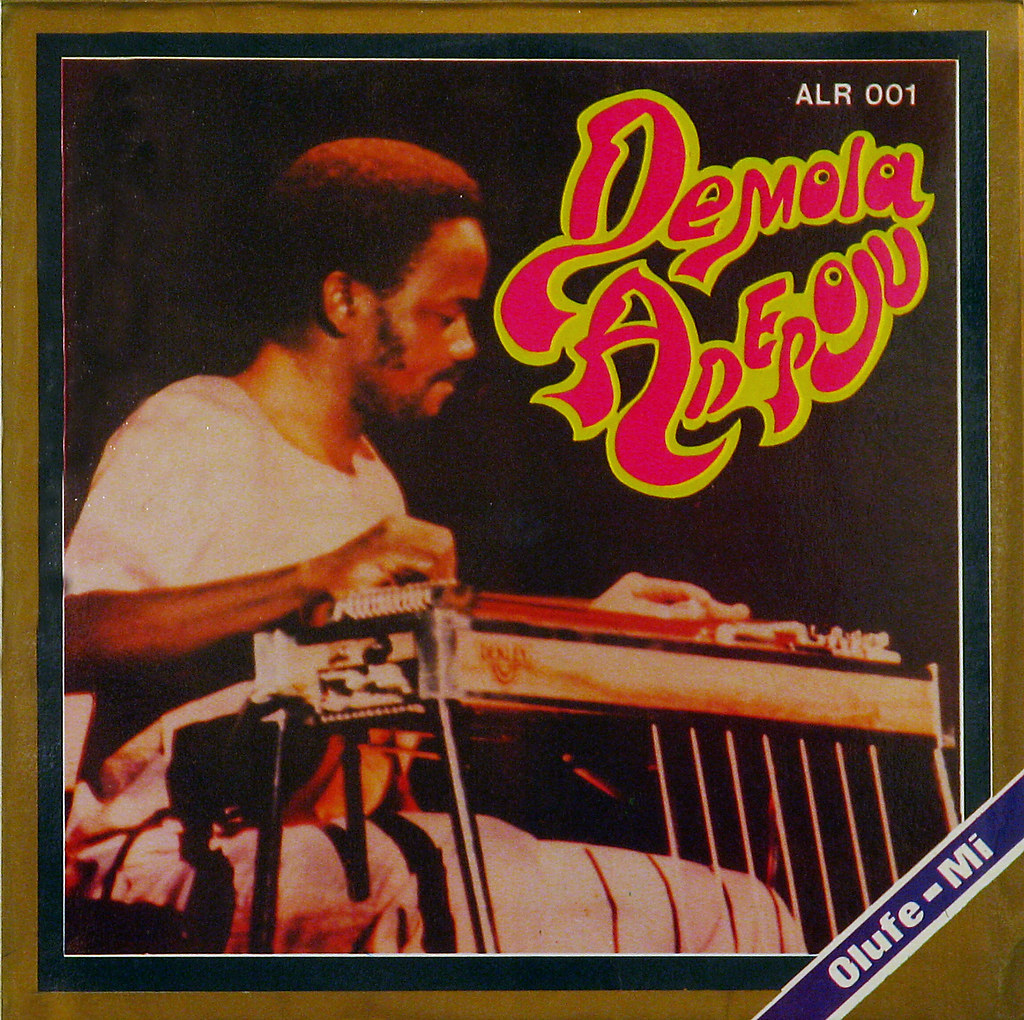
Pedal steel guitarists are practitioners of an arcane discipline, on par with the medieval harp or the ondes martenot. Possibly for this reason, steel players draw the wagons in a circle at social gatherings. Stand near two or three or more of them at a Fourth of July picnic and, if you are listening as the guitarists’ compare notes and complain about pedal flexibility or string gauges or the heft and finish of the large piece of smooth metal they use to barre chords and bend notes, you will lapse into a drowsy, dopey state that caffeine can't touch. The English saloon singer and art historian George Melly once generalized trombonists as the most neurotic of musicians, perpetually worried that their slide might be dented or bent. Melly obviously never met anyone who played pedal steel.
What the pedal steel fraternity made of Demola Adepoju, when King Sunny Adé and his African Beats first toured the U.S. circa ‘82, remains the stuff of conjecture. Demola was not your standard issue Nashville session guy, this much was certain. He was black. He played barefoot. He didn’t use a volume pedal, though he did use lots of signal processing. Sitting at the side of the stage, nodding his head in a near-somnolent state, he’d occasionally tear off reverb-drenched solos whose individual notes sounded like so many comets passing near Earth’s orbit. Demola was the type of pedal steel player (the late O.J. "Red" Rhodes, featured on Michael Nesmith's solo lp's, being another) capable of transforming a C&W cliché into a rural synthesizer.
Olufe-Mi is the only solo lp by Demola Adepoju of which I’m aware; this is the only copy I’ve ever encountered. Its four tracks could be thought of as Nigerian juju in chamber format (well, except for “Igba Aiye,” which sounds like a reggae cover of a Mac Davis song), with a very few players simulating the impact of Adé’s much larger band. That band had dissolved by the time of Olufe-Mi’s release in '85. Class act that he was, Adepoju still thanked King Sunny in the liners for the latter’s ‘Golden Advices.’ He also thanked Roger “One Take” Steffens, founding editor of The Beat, perennial M.C. of Los Angeles-area reggae shows and prime mover on the Bob Marley postmortem lecture circuit.
In the '80s, Demola Adepoju toured & recorded with the African Beats, played on Paul Simon’s Graceland album and was accorded a sidebar article in Guitar Player magazine. He lived and performed in the D.C. area for a while, post-Adé, before being turfed out of the U.S. on visa grounds. I have no idea of his activities during the past fifteen years. I hope that he’s doing well, as he deserves that much, if only for having made this most impressive album.
TECHNICAL NOTE: Ordinarily, I attempt to excise the scars of overplayed vinyl manually, drawing out the clicks and some of the distortion inherent in elderly microgroove recordings with the help of the pencil tool in Pro Tools editing software. Our last posting, Private Line, required several evenings’ worth of eye-crossing attention and the whole thing began to feel less like a labor of love and more like a morning paper route in winter. Then I scrutinized the sole copy available of Olufe-Mi, which had obviously been played with a darning needle for many years prior to finding sanctuary in an audiophile’s archive. For a day, I inhabited despair. A close friend, who has saved my sanity on more than one occasion, suggested the Restoration plug-in bundle offered by Waves. This suite of TDM plug-ins allows very nearly complete removal of the scar tissue common to decrepit vinyl. Olufe-Mi was my trial run with these tools and I’m pleased to report that they work without eliminating music, when used in moderation. Like that impulsive kid in the NRBQ song who discovers caution at the last moment, I will live to climb again.
I'll probably do a line of No Condition Is Permanent t-shirts, too, should demand warrant same. Yes, I'm hinting here, people.
OLUFE-MI
(vinyl coutesy of Dan Meinwald, E.A.R., USA)
Comments
King Sunny Adé is my great musical hero since the Island 'Juju Music'-record. I've collecting his European and Nigerian records since then. 'Bobby' is one of the most powerful records he made. Like 'Ja Funmi' this record is mid tempo, but with such a glorious drive. Fantastic. Other juju-musicians with great potential: Segun Adewale (I like his 'Adewale Play For Me' record on Stern's very much), Dele Abiodun and of course Ebenezer Obey. It's a pity that it's hard to get any jujurecords (except Sunny Adé) in Europa easily.
Count Reeshard, your weblog is so great, I can't hardly wait the next entry. With great R.E.S.P.E.C.T. - BoengLoekB, The Netherlands
COUNT REESHARD
http://permanentcondition.blogspot.com/
You mentioned the LP is hard to find.
Do you have a full picture of the album cover you can share?
Thanks